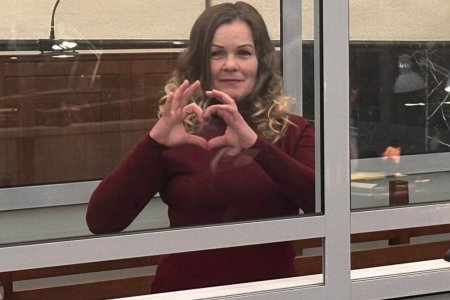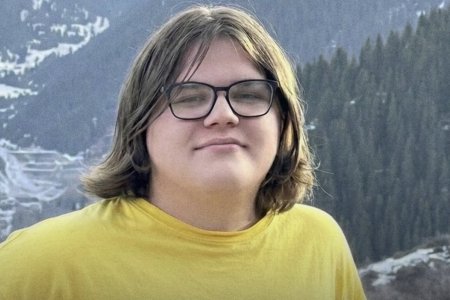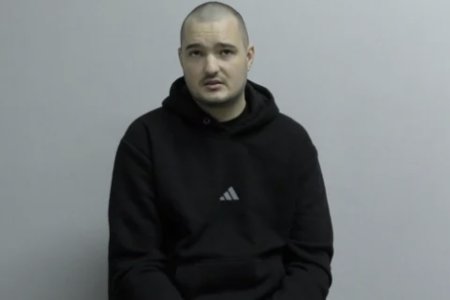
The ‘trial’ is underway in Russia of Serhiy Kuris, a 52-year-old Ukrainian abducted and tortured in occupied Donetsk almost five years ago. He is one of a large number of Ukrainian hostages against whom the aggressor state is now staging ‘trials’ under Russian legislation, despite his having been seized by the so-called ‘Donetsk people’s republic’ [‘DPR’], an entity which, at the time, Russia undoubtedly controlled, but had not officially recognized. Kuris had never concealed his pro-Ukrainian views, and the surreal ‘spying’ and ‘terrorism’ charges laid are probably linked solely with pro-Ukrainian posts or images found on his phone. He has explained that he only signed the ‘confessions’ put in front of him when his torturers threatened to torture his wife and small son, and rape his wife. He has not only retracted such illegally obtained documents, but has provided written testimony to the Southern District Military Court in Rostov with harrowing details of the torture applied and other illegal measures against him and his family. The document was read out by presiding ‘judge’ Igor Vladimirovich Kostin during the last hearing on 30 May, with the latter ordering a procedural check into the allegations made. Kostin himself has been involved in passing huge sentences on Crimean Tatar and other Ukrainian political prisoners, and there are no grounds for expecting such a ‘check’ to be anything more than a formality. There is, however, no reason to doubt Kuris’ own account, which is fully consistent with those of very many other civilian hostages seized either by the Russian proxy ‘Donetsk and Luhansk republics’ or by Russian military after the full-scale invasion of Ukraine.
As reported earlier, Kuris was seized on 6 September 2019, as he was returning home with his wife and their 18-month-year-old son. It is typical of the ‘DPR militants’ methods that the family’s car was also taken away, and never returned. Men from the so-called ‘DPR department for fighting organized crime’ brought Kuris back to his home four days later to carry out a ‘search’. Kuris had clearly been badly beaten, and was only half-conscious.
His family first learned what had happened after a hostage, released during the December 2019 exchange of prisoners, was able to smuggle out a letter from Kuris. He described the torture he had been subjected to and the fact that he had been thrown into the ‘department for fighting organized crime’s’ secret prison because he refused to sign the documents they thrust in front of him.
In his testimony to the court, Kuris writes that his captors told him that if he continued to resist, he would face “all the circles of hell since all the power is in their hands, and it’s nothing for them to kill me. Think who you got in the way of … You went to Ukraine and that alone is sufficient”. The condition, he adds, was simply: “admit to at least something or they’ll totally rip you apart.”
“Outraged at such treatment both of me and of my family, I categorically refused and suggested that they resolve the matter with whomever it was that I got in the way of.”
This response was not to the militants’ liking and he was subjected to savage beating, first in an office, then, because he was bleeding heavily, in the basement. The torture began then, he says, with his captors attaching electric currents to his hands and feet and dousing him in water. That lasted around 48 hours and then he was sent to what he later understood was a ‘prison’ in Donetsk where “the longest and most terrible torture took place”.
“I was thrown into a concrete cell of 1-2 metres squared, where I was in a semi-conscious state and from where I was dragged to the torture chamber where I was tortured with electric currents, after attaching wires to my extremities and genitals. They submerged me in water, hit my legs with a bat, burned cigarettes on me and, all the time, continued beating me. I was dragged there twice a day, and in the cell I was flung to the floor in my own blood or tied to the door. Sometimes I was taken to the department for fighting crime where they threatened to beat my wife and child in the same way and to rape my wife if I didn’t sign the documents. Since I couldn’t allow that, and by then had no doubt that those individuals were capable of anything, and my own organism was packing up, and, under the influence of hunger, thirst and the currents, I decided to sign everything.”
With respect to the ‘search’ of his home, Kuris notes that this was about plundering everything they found, including money, gold items, etc. The militants petrified his baby son by waving a knife around his throat and lashing out at his legs.
The charges, he notes, are based on photos and videos taken from his I-Phone and embellished with fabricated claims. The indictment is full of phrases like “unidentified individuals at an unidentified time and in an unidentified place”.
Kuris mentions that there are medical records confirming marks from the torture he endured. As reported, it was difficult to find a lawyer not fearful of taking on such a case, but the family did eventually succeed, and it was this lawyer who managed to get Kuris’ torture marks recorded. These included burns from electric shocks on his legs; festering sores on his wrists from being suspended by his wrists; and also burn marks from the cigarette butts that the militants stubbed out on his back.
In the earlier letter that Kuris managed to get out, via a released hostage, he wrote that between torture sessions, he was either thrown into the concrete cell or taken for “an interim conversation” to one of their interrogators who determined which torture to apply, then to a certain ‘Ivanov’. The latter openly said that he, and all ‘staff’ of the department are already Russian citizens and they’re allowed to torture as many as 500 innocent people just to find person working for the SBU” [Ukraine’s Security Service].
Kuris was, under so-called ‘DPR legislation’, and now is, under Russian, charged with ‘spying’ (Article 276 of Russia’s criminal code); ‘undergoing training in order to carry out terrorist activities’ (Article 205.3) and ‘involvement’ in a terrorist society’ (Article 205.4 § 2). There is nothing to suggest that any of the charges have any basis in fact and, in any case, Russia is an occupying power which has no right to abduct and apply its legislation against Ukrainian citizens.



